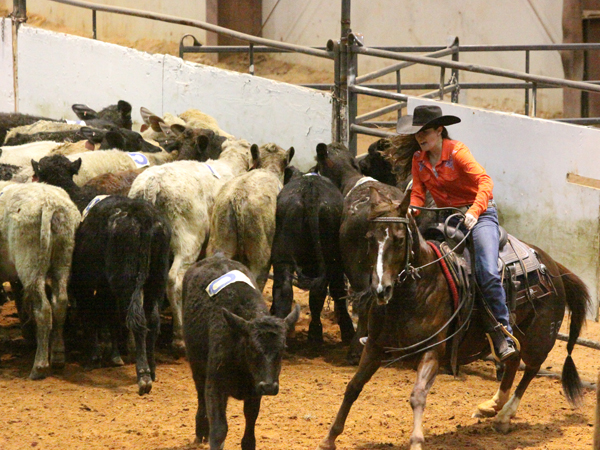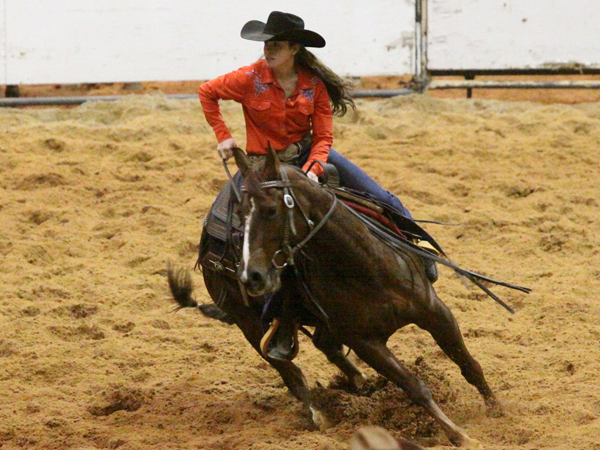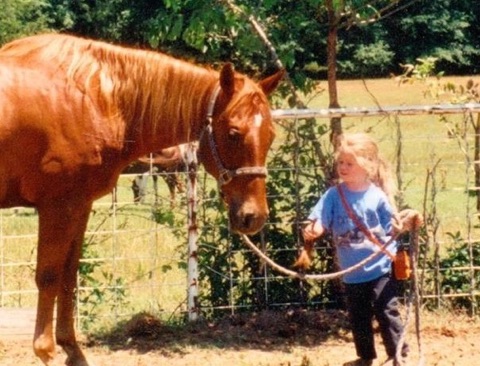People of the U: Carrie Dean

Carrie Dean can't remember the first time she rode a horse in the same way most people don't remember taking their first steps. She was too young to remember.
“I always tell people I was rocked to sleep on a horse instead of a rocking chair,” said Dean, a junior at the University of Mississippi School of Nursing. “I didn't start competing until I was 5 or 6, but I pretty much have grown up on a horse.”
Dean, who is from the Fannin community of Brandon, competes in a sport known as team penning with organizations such as the American Quarter Horse Association, United States Team Penning Association and the Dixie Regional Team Penning Association.
Dean and her horse Remi, who is registered as Uno Sheza Cat, took home the gold in the 2016 AQHA Amateur Team Penning World Championships. It was her first time to compete as an amateur, but it wasn't her first world championship. She was the winner in the AQHA Youth Team Penning World Championships five years in a row before moving to amateur at age 18.
Dean was introduced to penning and sorting cattle on horseback in backyard pens with her father, maternal uncle and cousin.
Dean, approximately 3 or 4 years old, holds the reins of her very first horse, Cowboy. Cowboy passed away on Monday, April 10.
“I remember growing up it was little shows around the house, but now it's just a huge sport all around the world,” she said. “It's a lot bigger deal than it was when [my dad] started.”
Team penning takes a combination of strategy, skill and luck - from both the rider and the horse.
Competitions are held in arenas around the world. On one end of the arena are 30 head of cattle, and on the other end is a pen. There's a foul line marked at one-third of the arena closest to the animals.
The cattle are divided into 10 groups of three, numbered from zero to nine. Three riders on horseback make up a team. When a number is called, the riders have 60 seconds to get the three head of cattle with that number - and only that number - separated from the herd and into the pen at the other end. If any number other than the number called gets past the foul line, the team forfeits the ride.
Any number of factors can be in play to work for or against a team: the skill level of each rider, the skill level of each horse, the order in which your team is called to compete or the emotional state of the cattle.
“There's so many factors besides your skill level that go into this,” Dean said. “You could be the best of the best and still not win sometimes because of bad luck.”

Dean rides Remi to take the gold medal in the AQHA Amateur World Championships in Oklahoma City. Photo courtesy of Charlette Robinson of Action Shots N More.
She said that bad luck might be a random, frantic cow that decides to shoot past the foul line with every team or being called to compete last and having to deal with 30 restless and unruly cows that are tired of being herded. Good luck would be seeing all the animals with the team's number on the outskirts of the herd when the timer starts.
“You have to know how to read a cow,” Dean said. “You have to spend a lot of time knowing the body language and how to kind of read their minds. Sometimes it's better to ride first on a herd of cattle when you have some unruly cows, before they get stirred up.”
She said that the more time spent around the animals, the easier it is to predict their movements and adapt the strategy.
“When you become a professional, you are not only thinking about how to predict the movements of the cows but also those of your partners” she said. “There are constantly things going through your head. It almost becomes instinct.”
Riders are ranked from one to seven nationally, and this ranking is used to build teams within competition classes. Dean is ranked as a six. Although ranked as a professional, she qualifies to compete in the amateur class because she does not train horses.
“Five through seven is considered a professional or an open rider,” Dean said. “Dustin, my brother-in-law is a professional, and he has taught me so much. He's the reason that I am good. He's a number seven, and I'm a number six.”

Dean says she's never loved a horse like she loves her mare, Remi, pictured above, but remains thankful for how much her horse Moose (Dual Playgun) taught her about penning. Photo courtesy of Charlette Robinson of Action Shots N More.
The sport is a family pastime. Dean's father Rick, her sister and brother-in law, Lee Ann and Dustin Johnson, and her boyfriend Tanner Keith all compete. Her family, including her mother Peggy, hit the road with a 10-horse trailer about twice a month to attend events. The farthest away having been in Las Vegas.
“That's as far as we've ever been, and I don't think we'll ever go back,” Dean said. “It took two days to get to Las Vegas. It was a very, very long trip and hard on horses. You have to find a place to stall them overnight.”
Although she doesn't compete in the sport with the rest of the family, Dean's mother is her inspiration for becoming a nurse.
“My mom had breast cancer,” Dean said. “When she was pregnant with me, she had a little lump. She went and got it checked out, and they told her it was not a big deal. When the mammogram was reported as 'normal' my mom asked the nurse what she should do about it.”
The nurse's reply was, “Nothing.”
After Dean was born, the lump grew to the size of a golf ball. Her mother was diagnosed with breast cancer and had to undergo a mastectomy in 1996, followed by high-dose chemo, stem cell replacement and radiation.
“As a nurse, I have the potential to really change people's lives,” Dean said. “I am determined to become the kind of nurse I wish my mother had had in the doctor's office that day.”
According to Jennifer Hargett, instructor of nursing, Dean is well on her way to being a better nurse.
“She is an exceptional student,” said Hargett. “She does very well in the classroom, and she is also wonderful in the clinical setting, which is where I mostly see her. I think she is exactly where she needs to be.”



